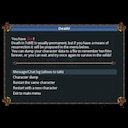Установить Steam
войти
|
язык
简体中文 (упрощенный китайский)
繁體中文 (традиционный китайский)
日本語 (японский)
한국어 (корейский)
ไทย (тайский)
Български (болгарский)
Čeština (чешский)
Dansk (датский)
Deutsch (немецкий)
English (английский)
Español - España (испанский)
Español - Latinoamérica (латиноам. испанский)
Ελληνικά (греческий)
Français (французский)
Italiano (итальянский)
Bahasa Indonesia (индонезийский)
Magyar (венгерский)
Nederlands (нидерландский)
Norsk (норвежский)
Polski (польский)
Português (португальский)
Português-Brasil (бразильский португальский)
Română (румынский)
Suomi (финский)
Svenska (шведский)
Türkçe (турецкий)
Tiếng Việt (вьетнамский)
Українська (украинский)
Сообщить о проблеме с переводом



















Stone magic is unlocked by defeating a unique enemy that sometimes spawns in the game world. It's called Harkor'Zun.
But, I'm just getting started playing Maj'Eyal, and I'm curious how to get Earthen Missiles for the Arcane Blade character? The guide mentioned that it's not immediately available to this class, but found as a secret event or something.
Any info on how to get Earthen Missiles is greatly appreciated. Thanks!